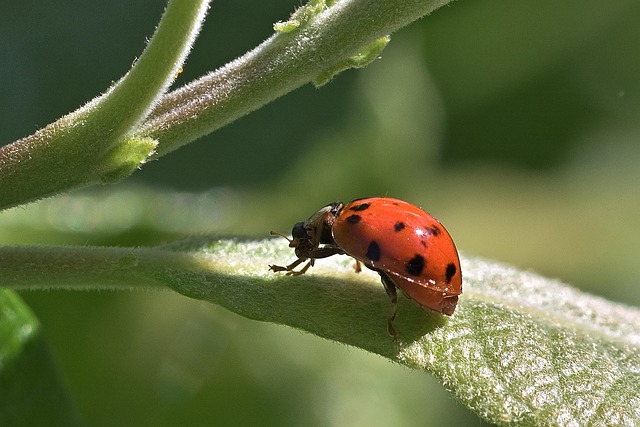Adopting eco-beetle control solutions offers a sustainable, non-toxic approach to managing food storage pests like mites, weevils, and larvae. Unlike traditional chemical pesticides, these methods use natural predators (like Tineid moths and Nipponia bees) and optimal storage conditions (low humidity, cool temps) to protect stored food, tobacco, and pantry items. Best practices include regular cleaning, airtight containers, physical barriers, and eco-friendly repellents or traps.
“Discover effective strategies to combat common pantry pests like stored food, tobacco, and other items with targeted treatments. Learn how eco-friendly beetle control solutions offer a sustainable approach to pest management for stored goods, ensuring your home remains free from unwanted visitors. This comprehensive guide explores best practices for preventive measures, providing you with the knowledge to safeguard your pantry. From understanding targeted treatments to implementing effective strategies, this article has everything you need to keep your food secure.”
Understanding Targeted Treatments for Food Storage Pests
Understanding Targeted Treatments for Food Storage Pests requires a shift in approach from traditional pest control methods. Instead of broad-spectrum chemicals, eco-beetle control solutions offer a more sustainable and precise alternative. These solutions are designed to target specific pests that infiltrate stored food, tobacco, and pantry items without harming non-target organisms or the environment.
Eco-beetle control solutions leverage natural predators and biological agents to disrupt pest populations. For instance, certain species of beetles are naturally attracted to and feed on storage pests like mites and larvae. By introducing these eco-friendly beetles, households can effectively manage infestations while minimizing exposure to harmful chemicals. This targeted approach ensures that only the intended pests are affected, preserving the integrity of stored food items and maintaining a healthier living environment.
Eco-Friendly Beetle Control Solutions for Stored Goods
In an era where sustainability is at the forefront, adopting eco-friendly methods for pest control in stored food and pantry items is both necessary and beneficial. Traditional chemical pesticides can leave harmful residues and contribute to environmental pollution. For this reason, turning to natural alternatives like eco-beetle control solutions presents a greener approach. These innovative methods leverage specific species of beetles that feed on and effectively manage infestations of common pests such as weevils, moths, and beetles.
Eco-beetle control solutions offer a safe and environmentally friendly way to protect stored goods without compromising food safety. By introducing these beneficial insects into warehouses, storage facilities, or pantries, potential pest issues can be proactively addressed. The use of beetles not only helps in controlling existing infestations but also acts as a deterrent against future invasions, ensuring that your food items remain fresh and intact for longer periods. This natural method of beetle control is safe for humans, pets, and the environment, making it an ideal choice for businesses and households alike who prioritize eco-conscious practices.
Effective Strategies to Manage Tobacco Pests
Managing tobacco pests effectively is a critical step in preserving stored food and pantry items, especially considering the delicate nature of these products. Integrated Pest Management (IPM) strategies offer sustainable and eco-friendly solutions to control tobacco pests without harming your health or the environment. One innovative approach involves the introduction of eco-beetle control methods, such as using beneficial insects like Tineid moths or Nipponia bees. These natural predators feed on tobacco pest larvae, effectively reducing their population.
Additionally, proper storage conditions are paramount. Maintaining low humidity and cool temperatures can significantly deter pests. Implementing physical barriers, like food-grade silicone or metal mesh screens, in storage areas helps prevent infestation. Regular cleaning and sanitizing of storage containers and pantry areas also play a crucial role in minimizing pest activity, ensuring the longevity of your stored goods.
Safeguarding Your Pantry: Best Practices for Preventive Measures
To safeguard your pantry from stored food pests like ecobeetles and others, start by adopting stringent hygiene practices. Regularly clean and inspect all storage areas, removing any spoiled or infested items immediately. Keep pantry shelves and floors spotless, eliminating crumbs and spills that may attract pests. Store food in airtight containers made of durable, pest-resistant materials. Label and date all stored items to ensure rotation and prevent waste, as pests are often drawn to older, forgotten foods.
Implement physical barriers to deter pests from entering your pantry. Seal gaps around doors and windows with caulk or weatherstripping. Use fine mesh screens on vents and exhaust fans. Consider the placement of traps near entry points, utilizing eco-friendly control solutions like natural repellents or pheromone traps. Regularly inspect incoming shipments and deliveries for signs of infestation to prevent introducing pests into your pantry environment.
In conclusion, implementing targeted treatments and adopting eco-friendly methods like eco-beetle control solutions are key to effectively managing food storage pests, including those that affect tobacco and pantry items. By combining best practices for preventive measures with strategic interventions, individuals and businesses can ensure the longevity and quality of their stored goods while minimising environmental impact. These integrated pest management approaches offer a comprehensive strategy for safeguarding our food supply chains.
